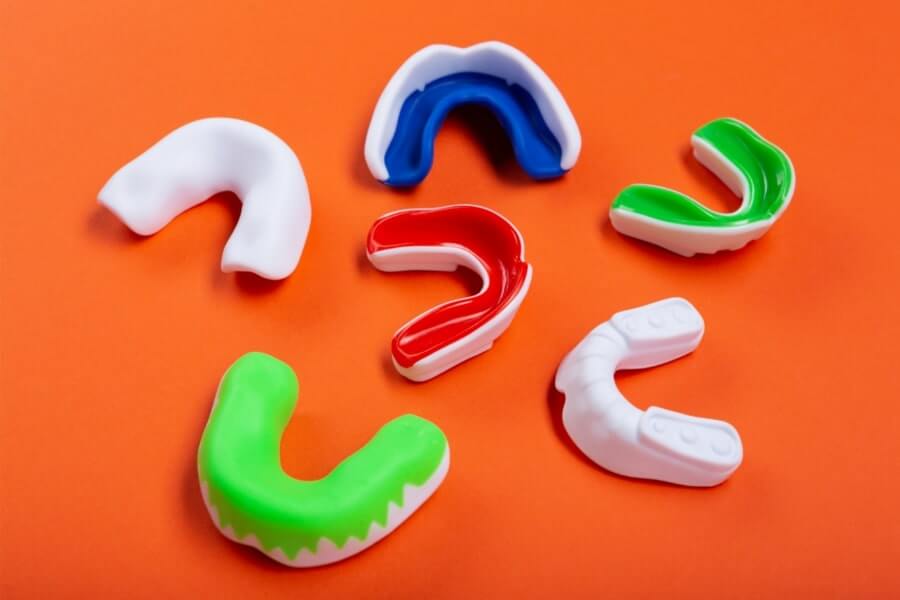If you struggle with teeth grinding, a mouthguard from a Webster dental office is one possible solution. This tool is often used to prevent lasting damage from grinding your teeth, but you may be wondering if it does any damage on its own. Can a mouthguard ruin your teeth? Do the pros outweigh the cons? Let’s take a look.
What Are Mouthguards and How Are They Used?
Mouthguards are dental devices that cover your teeth and protect your teeth, gums, tongue, and cheeks from trauma caused by contact sports or teeth grinding, also known as bruxism.1 Essentially, an effective mouthguard is like a crash helmet for your mouth.
You may buy mouthguards over the counter for teeth grinding or for playing sports, but they’re not as effective as custom-fitted mouthguards from your dentist. Mouthguards are typically recommended for people who:
- Grind their teeth
- Play contact sports like lacrosse, hockey, football, basketball, soccer, or wrestling, all of which have a risk of injury from contact or a ball or equipment hitting the face
- Engage in non-contact sports or activities that carry a risk of trauma to the head or mouth, such as gymnastics, biking, and ice skating.
What Are the Benefits of Mouthguards?
Teeth grinding and trauma to the face or mouth can lead to chipped, broken, or lost teeth and trauma to the gums, tongue, and jaw. Wearing a mouthguard during these activities can prevent damage to the teeth and soft-tissue damage to the lips, gums, tongue, and inner cheeks. It also helps to prevent nerve damage to a tooth.
Can Mouthguards Damage Your Teeth or Gums?
When used correctly, mouthguards protect your teeth and gums rather than damage them. If your mouthguard is dirty, damaged, or ill-fitting, however, it can cause harm to your mouth.
Mouthguards should be cleaned continuously, and you should always brush your teeth before using one. A dirty mouthguard can harbor bacteria that can negatively impact your tooth and gum health.
Furthermore, a mouthguard that is too big, too small, or damaged can be uncomfortable and cause gum irritation. When your gums are constantly irritated, that can lead to infection. Poorly fitted or damaged mouthguards can also affect your breathing and make sleep difficult.
Finally, if your mouthguard doesn’t fit comfortably, you’ll be less inclined to use it, and it won’t be a suitable solution for your bruxism.
Advantages of Custom-Fit Mouthguards
A custom-fit mouthguard is more expensive than a one-size-fits-all or stock mouthguard upfront, but it’s worth the benefits of comfort. A custom-fit mouthguard allows you to breathe and speak comfortably, so you may be more inclined to wear it regularly.
Having a custom comfortable mouthguard also prevents you from developing dental problems related to an ill-fitted mouthguard, which can be costly down the road.
How to Care for a Mouthguard
Keeping your mouthguard clean is one of the most critical aspects of its care and use. A dirty mouthguard increases your risk of infection and gum damage, so it’s essential to clean it in between every use.
To clean your mouthguard, use warm soapy water and a toothbrush to thoroughly clean it daily. Your mouthguard doesn’t need to be boiled or scrubbed, as these cleaning methods could damage it and cause minor scratches where bacteria can thrive.
Learn More About Mouthguards in Webster at Empire Dental Care
If you grind your teeth, a mouthguard from your Webster dentist can be just the solution you need to get a good night’s sleep. At Empire Dental Care, we offer custom-fit mouthguards for teeth grinding in Webster, NY. To schedule your consultation, please contact us online or call us at 585-671-1650!
Sources:
[1] https://www.mayoclinic.org/diseases-conditions/bruxism/symptoms-causes/syc-20356095


